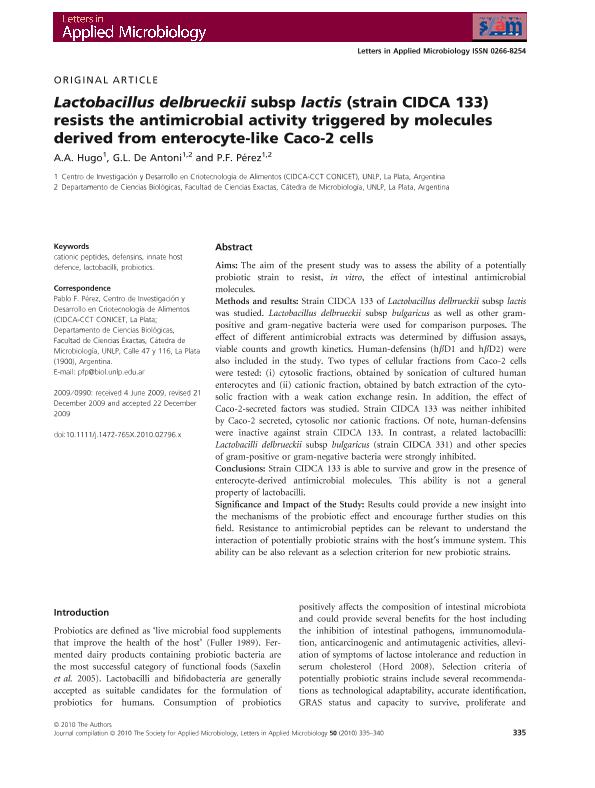Mostrar el registro sencillo del ítem
dc.contributor.author
Hugo, Ayelen Amelia

dc.contributor.author
de Antoni, Graciela Liliana

dc.contributor.author
Perez, Pablo Fernando

dc.date.available
2021-07-08T12:52:06Z
dc.date.issued
2010-04
dc.identifier.citation
Hugo, Ayelen Amelia; de Antoni, Graciela Liliana; Perez, Pablo Fernando; Lactobacillus delbrueckii subsp lactis (strain CIDCA 133) resists the antimicrobial activity triggered by molecules derived from enterocyte-like Caco-2 cells; Wiley Blackwell Publishing, Inc; Letters in Applied Microbiology; 50; 4; 4-2010; 335-340
dc.identifier.issn
0266-8254
dc.identifier.uri
http://hdl.handle.net/11336/135712
dc.description.abstract
Aims: The aim of the present study was to assess the ability of a potentially probiotic strain to resist, in vitro, the effect of intestinal antimicrobial molecules. Methods and results: Strain CIDCA 133 of Lactobacillus delbrueckii subsp lactis was studied. Lactobacillus delbrueckii subsp bulgaricus as well as other gram-positive and gram-negative bacteria were used for comparison purposes. The effect of different antimicrobial extracts was determined by diffusion assays, viable counts and growth kinetics. Human-defensins (hβD1 and hβD2) were also included in the study. Two types of cellular fractions from Caco-2 cells were tested: (i) cytosolic fractions, obtained by sonication of cultured human enterocytes and (ii) cationic fraction, obtained by batch extraction of the cytosolic fraction with a weak cation exchange resin. In addition, the effect of Caco-2-secreted factors was studied. Strain CIDCA 133 was neither inhibited by Caco-2 secreted, cytosolic nor cationic fractions. Of note, human-defensins were inactive against strain CIDCA 133. In contrast, a related lactobacilli: Lactobacilli delbrueckii subsp bulgaricus (strain CIDCA 331) and other species of gram-positive or gram-negative bacteria were strongly inhibited. Conclusions: Strain CIDCA 133 is able to survive and grow in the presence of enterocyte-derived antimicrobial molecules. This ability is not a general property of lactobacilli. Significance and Impact of the Study: Results could provide a new insight into the mechanisms of the probiotic effect and encourage further studies on this field. Resistance to antimicrobial peptides can be relevant to understand the interaction of potentially probiotic strains with the host′s immune system. This ability can be also relevant as a selection criterion for new probiotic strains.
dc.format
application/pdf
dc.language.iso
eng
dc.publisher
Wiley Blackwell Publishing, Inc

dc.rights
info:eu-repo/semantics/openAccess
dc.rights.uri
https://creativecommons.org/licenses/by-nc-sa/2.5/ar/
dc.subject
CATIONIC PEPTIDES
dc.subject
DEFENSINS
dc.subject
INNATE HOST DEFENCE
dc.subject
LACTOBACILLI
dc.subject
PROBIOTICS
dc.subject.classification
Biología Celular, Microbiología

dc.subject.classification
Ciencias Biológicas

dc.subject.classification
CIENCIAS NATURALES Y EXACTAS

dc.title
Lactobacillus delbrueckii subsp lactis (strain CIDCA 133) resists the antimicrobial activity triggered by molecules derived from enterocyte-like Caco-2 cells
dc.type
info:eu-repo/semantics/article
dc.type
info:ar-repo/semantics/artículo
dc.type
info:eu-repo/semantics/publishedVersion
dc.date.updated
2021-06-30T13:32:53Z
dc.identifier.eissn
1472-765X
dc.journal.volume
50
dc.journal.number
4
dc.journal.pagination
335-340
dc.journal.pais
Reino Unido

dc.journal.ciudad
Londres
dc.description.fil
Fil: Hugo, Ayelen Amelia. Provincia de Buenos Aires. Gobernación. Comisión de Investigaciones Científicas. Centro de Investigación y Desarrollo en Criotecnología de Alimentos. Consejo Nacional de Investigaciones Científicas y Técnicas. Centro Científico Tecnológico Conicet - La Plata. Centro de Investigación y Desarrollo en Criotecnología de Alimentos. Universidad Nacional de La Plata. Facultad de Ciencias Exactas. Centro de Investigación y Desarrollo en Criotecnología de Alimentos; Argentina
dc.description.fil
Fil: de Antoni, Graciela Liliana. Provincia de Buenos Aires. Gobernación. Comisión de Investigaciones Científicas. Centro de Investigación y Desarrollo en Criotecnología de Alimentos. Consejo Nacional de Investigaciones Científicas y Técnicas. Centro Científico Tecnológico Conicet - La Plata. Centro de Investigación y Desarrollo en Criotecnología de Alimentos. Universidad Nacional de La Plata. Facultad de Ciencias Exactas. Centro de Investigación y Desarrollo en Criotecnología de Alimentos; Argentina
dc.description.fil
Fil: Perez, Pablo Fernando. Provincia de Buenos Aires. Gobernación. Comisión de Investigaciones Científicas. Centro de Investigación y Desarrollo en Criotecnología de Alimentos. Consejo Nacional de Investigaciones Científicas y Técnicas. Centro Científico Tecnológico Conicet - La Plata. Centro de Investigación y Desarrollo en Criotecnología de Alimentos. Universidad Nacional de La Plata. Facultad de Ciencias Exactas. Centro de Investigación y Desarrollo en Criotecnología de Alimentos; Argentina
dc.journal.title
Letters in Applied Microbiology

dc.relation.alternativeid
info:eu-repo/semantics/altIdentifier/doi/http://dx.doi.org/10.1111/j.1472-765X.2010.02796.x
dc.relation.alternativeid
info:eu-repo/semantics/altIdentifier/url/https://sfamjournals.onlinelibrary.wiley.com/doi/10.1111/j.1472-765X.2010.02796.x
Archivos asociados
